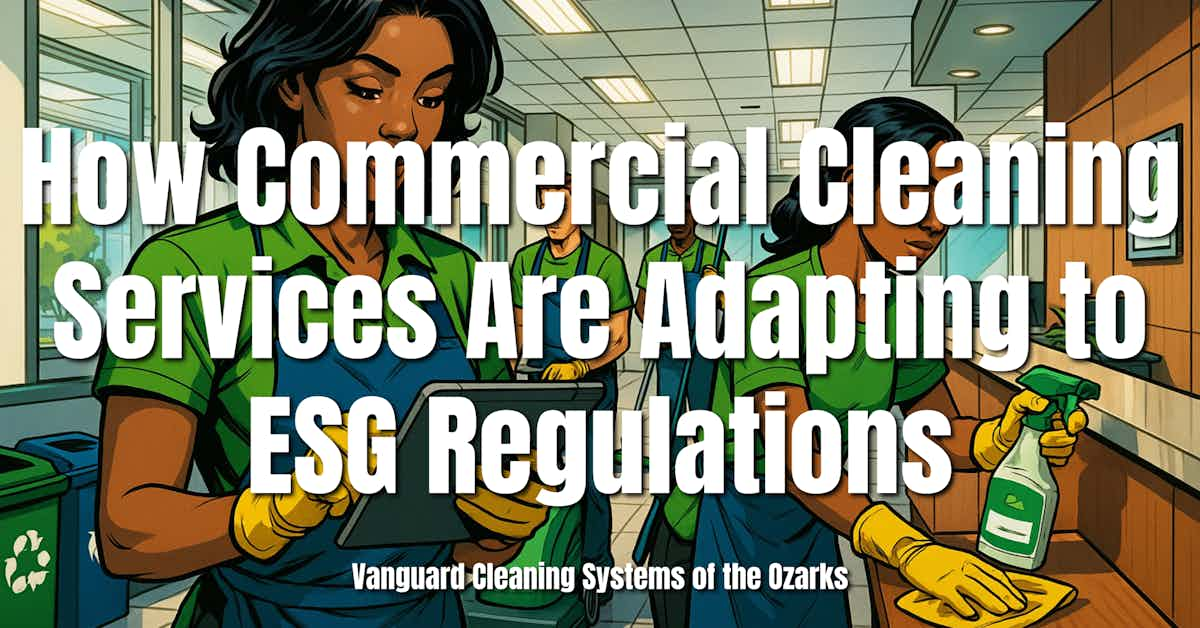Commercial cleaning companies are reinventing their operations to meet ESG standards, transforming from service providers into sustainability partners.

Why ESG Is Changing the Commercial Cleaning Industry
Environmental, Social, and Governance (ESG) standards are no longer optional—they’re becoming embedded in how commercial cleaning services operate. As property owners and facility managers face increasing pressure to report sustainability metrics, their vendors must also adapt. Cleaning companies are now expected to deliver more than cleanliness—they must contribute to emissions reduction, responsible labor practices, and transparent governance. This shift is redefining what it means to be a commercial cleaning provider in an ESG-focused market. From product selection to workforce policies, every decision now ties back to measurable impact.
Environmental Targets Lead to Greener Cleaning Practices
Eco-friendly products are now baseline expectations
- Cleaning companies are replacing traditional chemical solutions with biodegradable, non-toxic alternatives.
- Demand for third-party certifications like Green Seal and EPA Safer Choice is rising.
- Clients increasingly expect documented proof that products meet environmental standards.
Sustainable equipment reduces resource waste
- Energy-efficient vacuums, auto-scrubbers, and low-water mops are standardizing across operations.
- Automated dosing systems help limit chemical overuse and reduce runoff.
- Battery-powered equipment with longer lifespans is favored for its reduced carbon footprint.
Operations focus on measurable environmental impact
- Companies are tracking chemical usage, water consumption, and energy output per site.
- These metrics feed into internal ESG dashboards and client-facing reports.
- Reduced emissions and waste generation contribute directly to building-wide sustainability goals.
ESG Disclosures Require Consistent Data Tracking
Clients demand ESG-aligned performance metrics
- Facility managers and building owners now require vendors to supply sustainability data.
- Cleaning firms must show how their services support LEED, WELL, or other green building certifications.
- Transparency is essential for maintaining contracts and winning bids.
Digital tools simplify reporting and verification
- Software platforms log cleaning frequency, product usage, waste output, and resource efficiency.
- Cloud-based systems allow clients to access ESG performance in real time.
- QR-coded supply tracking and IoT-enabled equipment feed data directly into compliance systems.
Compliance depends on audit-ready records
- ESG regulations increasingly require verifiable data, not just policy declarations.
- Cleaning companies are developing internal reporting templates aligned with global frameworks.
- These records prepare firms for client audits, RFP evaluations, and third-party reviews.
Governance and Compliance Structures Are Evolving
ESG oversight is becoming a formal responsibility
- Cleaning companies are appointing internal ESG coordinators or teams to manage compliance.
- These roles ensure alignment with client expectations, legal requirements, and company-wide sustainability goals.
- Regular reviews and reporting cycles are now part of routine operations.
Contracts reflect ESG accountability
- Service agreements increasingly include sustainability clauses tied to performance benchmarks.
- Clients require documentation on eco-friendly practices, fair labor policies, and ethical sourcing.
- Failure to meet ESG-related terms can affect contract renewal and vendor status.
Standard procedures now include ESG protocols
- Cleaning checklists are being updated with environmental and safety compliance tasks.
- Employee handbooks include sections on ethical conduct, data handling, and reporting violations.
- Governance practices are designed to support consistency, transparency, and long-term risk reduction.
Social Responsibility Is Built Into Workforce Models
Fair labor practices are front and center
- Cleaning firms are emphasizing wage transparency, safe working conditions, and fair scheduling.
- Equal opportunity hiring and inclusive workforce policies are being adopted across the industry.
- Union partnerships and third-party labor audits are becoming more common in large contracts.
Employee development supports ESG goals
- Training programs now include ESG awareness, safety protocols, and ethical conduct.
- Upskilling opportunities—like certifications in green cleaning or equipment handling—boost retention.
- Health benefits and wellness programs reduce absenteeism and increase workforce stability.
Community engagement builds credibility
- Firms are prioritizing local hiring to reduce commute emissions and support regional economies.
- Volunteer initiatives, donation drives, and partnerships with nonprofits reflect a commitment to social impact.
- These practices align with client values and help meet shared ESG reporting requirements.
Client Partnerships Are ESG-Driven
Clients want aligned vendors, not just service providers
- Building owners and facility managers prioritize cleaning partners who share their ESG values.
- ESG alignment influences vendor selection, especially in corporate, healthcare, and educational sectors.
- Cleaning firms are now expected to support tenant wellness and indoor environmental quality.
ESG requirements are baked into RFPs and renewals
- Requests for proposals increasingly include ESG scoring criteria alongside pricing and experience.
- Renewal decisions often hinge on past ESG performance and documentation.
- Vendors unable to produce environmental and social impact data risk being disqualified.
Collaboration improves outcomes for both sides
- Shared sustainability goals foster deeper vendor-client relationships.
- Cleaning companies can help clients achieve certifications like LEED, WELL, and Fitwel.
- Co-branded ESG reports demonstrate impact, building trust and long-term engagement.
ESG Readiness Strengthens Market Competitiveness
Proactive firms stand out in crowded markets
- Cleaning companies with established ESG frameworks are winning larger contracts and long-term partnerships.
- Demonstrated sustainability and governance maturity help build trust with risk-averse clients and investors.
- These firms are positioned as industry leaders in both service quality and ethical standards.
Financial and reputational benefits go hand-in-hand
- ESG-aligned companies enjoy improved access to financing and favorable insurance terms.
- Publicly shared ESG performance attracts positive media coverage and enhances brand image.
- Strong governance reduces regulatory risk and supports long-term operational stability.
Adapting now prepares companies for future regulations
- ESG rules are tightening globally, and early adopters will face fewer transition hurdles.
- Embedding ESG in business strategy protects against compliance gaps and greenwashing claims.
- Firms that integrate ESG across all functions are better equipped to scale and adapt in a shifting market.
ESG Compliance and Commercial Cleaning – Frequently Asked Questions
What is ESG, and why does it matter to cleaning companies?
ESG stands for Environmental, Social, and Governance. It's a global framework for evaluating sustainable and ethical business practices. Cleaning companies are now expected to align with ESG standards to support client compliance and improve operational integrity.
How are cleaning services adapting to ESG requirements?
They’re switching to green-certified products, digitizing data tracking, implementing ethical labor policies, and formalizing ESG reporting procedures.
Do clients really care about a cleaning company’s ESG practices?
Yes. Many clients, especially in real estate and healthcare, now require ESG metrics from vendors as part of contract selection and renewal.
What kinds of data do cleaning companies need to provide?
Usage logs for chemicals, equipment efficiency, training documentation, labor practices, and community engagement activities are often required.
How does ESG impact cleaning staff?
Employees benefit from safer products, improved training, and stronger workplace protections, including fair wages and clear advancement paths.
Are there financial benefits to ESG adoption?
Yes. Companies that meet ESG standards may receive more contract opportunities, better financing terms, and stronger reputational trust.
What if a cleaning company doesn’t comply with ESG standards?
They may lose bids, struggle with client retention, and face scrutiny or penalties as ESG regulations become more enforceable.
References
- Jaspers, E., & Ankerstjerne, P. (2023). The ESG challenge for real estate. Corporate Real Estate Journal. https://doi.org/10.69554/iztj3479
- Wu, Y. (2025). Adaptation and Challenges: The State, Impact, and Corporate Implementation of Global ESG Disclosure Regulations. Journal of Global Trends in Social Science. https://doi.org/10.70731/wm839928
- Antonini, C., Carrasco, P., Gomez-Conde, J., & Luque, M. (2021). The impact of non-financial reporting regulations on ESG management systems: the case of Directive 2014/95/EU. SSRN Electronic Journal. https://doi.org/10.2139/ssrn.3874896
- Hoss, A., & Luppi, L. (2023). The state of ESG investing in Canada’s commercial real estate market : Opportunities and risks. Corporate Real Estate Journal. https://doi.org/10.69554/nsxs9979
- Yang, X., Shira, R., Dang, L., & Hao, P. (2024). Unforeseen Benefits: Can ESG Enhance Corporate Access to Commercial Credit Financing?. Research in International Business and Finance. https://doi.org/10.1016/j.ribaf.2024.102735
- Deng, C., Peng, W., Dou, Z., & Zhang, Q. (2024). Environmental Background Directors and ESG Performance: A Perspective on Green Governance. Sustainability. https://doi.org/10.3390/su162310559
Conclusion
ESG regulations are no longer just a concern for real estate investors—they’re reshaping the expectations placed on commercial cleaning providers. From eco-friendly product use to workforce fairness and transparent data reporting, cleaning companies are being asked to meet higher standards across every aspect of their operations.
Those that adapt quickly are gaining competitive advantages, forming deeper client partnerships, and building long-term resilience. ESG alignment is no longer a checkbox—it’s a differentiator. In today’s market, cleaning services must go beyond hygiene to become active contributors to environmental stewardship, social responsibility, and good governance.
Vanguard Cleaning Systems of the Ozarks' franchise-owned custodial service provider business cleans more than 8M sq. ft. weekly, maintaining an industry-topping 95+% of its customer base, year-over-year, and boasting more than 60 5-star Google reviews.
Need more capability from your vendor partners? --Let's talk.
In Oklahoma, dial 918-960-4450
In Arkansas, dial 479-717-2410
In Missouri, dial 417-812-9777

